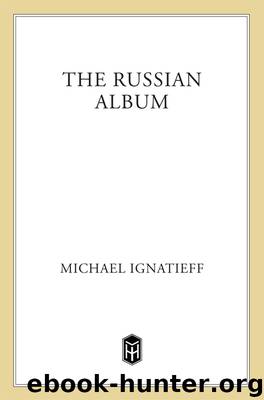The Russian Album by Michael Ignatieff

Author:Michael Ignatieff
Language: eng
Format: epub
ISBN: 9781466889057
Publisher: Picador
SIX
REVOLUTION
‘Go to your mother’ had been the Tsar’s last words. After his final audience with the Tsar, Paul travelled down to Kroupodernitsa to be with his mother. In the crypt of the village church they sang the pannihida, the memorial service for the dead, on the anniversary of his father’s death. They stood together, mother and son, in the low vaulted crypt lit by the icon lamps, and on the black basalt tomb the inscription ‘Peking and San Stefano’ gleamed like a scar.
Paul had been a liberal constitutional monarchist, his father a defender of autocracy: both had gone under, at fifty, at the height of their powers, cast away by a regime they had tried to serve. They were too much alike, too much of one flesh, for Paul to escape the same fatal unwinding, the inner dissolution that had befallen his father. The coils of energy, will and motive wound tight for fifteen years began to unravel.
While the wind whistled across the bare fields, Paul sat with his mother on the sofa in the sitting room at Kroupodernitsa, opening more than 3000 letters and telegrams which arrived at the estate once his dismissal was announced. The zemstvo movement told him his work would not be forgotten and teachers’ unions from Smolensk to Vladivostok sent him messages of support.
The church choir had prepared a performance of extracts from Glinka’s A Life for the Tsar, and they asked Paul to sing a solo part. The concert was given in the sitting room of the big house. His mother, matriarch of the village, swathed in white shawls, sat by the fire with Paul’s sister Mika beside her. Around them were ranged the village elders, the head of the fire brigade and the priest, and against the walls stood the servants who had taught Paul to ride and hunt and fish – Mitro, Sessoueff, Rudnitsky and Vassilieff, together with their wives and children. Still more villagers stood outside, their faces against the veranda windows. Everyone sang the patriotic choruses, and then they listened while their master sang the solo, which they cheered and made him repeat. It was called ‘In The Storm’.
Paul stayed with his mother for six weeks and returned to the capital in mid-February 1917. On his way back from the station in Petrograd, he passed detachments of Siberian Cossacks on their small shaggy ponies, champing and pawing the frozen ground of the private courtyards in the streets near his home. Machine-gun nests were going up on the rooftops of public buildings.
By then the family had moved into a big house on Fourstatskaya street, a block away from the Tauride Palace where the Duma held its sittings. It was in a leafy and substantial district where the fashionable regiments had their barracks and fashionable people had their mansions. Theirs was a three-storey edifice with Corinthian columns around the windows and large iron gates guarding the driveway. Built as the Spanish embassy in the 1890s, it was decorated in the florid style of Spanish baroque.
Download
This site does not store any files on its server. We only index and link to content provided by other sites. Please contact the content providers to delete copyright contents if any and email us, we'll remove relevant links or contents immediately.
| Africa | Americas |
| Arctic & Antarctica | Asia |
| Australia & Oceania | Europe |
| Middle East | Russia |
| United States | World |
| Ancient Civilizations | Military |
| Historical Study & Educational Resources |
Red Famine: Stalin's War on Ukraine by Anne Applebaum(2464)
Chernobyl by Serhii Plokhy(2128)
Midnight in Chernobyl by Adam Higginbotham(2079)
The House of Government by Slezkine Yuri(1845)
Midnight in Chernobyl: The Untold Story of the World's Greatest Nuclear Disaster by Adam Higginbotham(1775)
Red Shambhala by Andrei Znamenski(1748)
The Gulag Archipelago (Vintage Classics) by Aleksandr Solzhenitsyn(1725)
From Cold War to Hot Peace by Michael McFaul(1712)
All the Kremlin's Men by Mikhail Zygar(1696)
Putin's Labyrinth(1656)
Red Notice by Bill Browder(1591)
The Future Is History by Masha Gessen(1591)
From Russia with Lunch by David Smiedt(1551)
A People's Tragedy by Orlando Figes(1544)
The Romanovs by Simon Sebag Montefiore(1486)
How to Tame a Fox (and Build a Dog): Visionary Scientists and a Siberian Tale of Jump-Started Evolution by Lee Alan Dugatkin & Lyudmila Trut(1469)
Putin's Labyrinth: Spies, Murder, and the Dark Heart of the New Russia(1455)
The Lost Spy by Andrew Meier(1398)
Art and Revolution by John Berger(1386)
